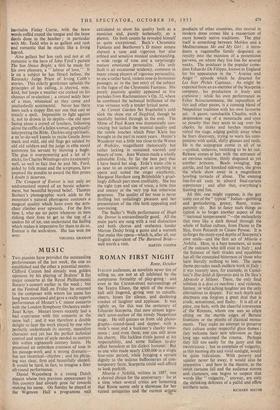ROMAN FIRST NIGHT
Rome, October
ITALIAN audiences, as novelists never tire of telling us, • are not at all inhibited by the sumptuous formality of play-going : and even in the Curzon-street surroundings of the Teatro Eliseo, the spirit of the music- hall still lingered, giving vent to catcalls, cheers, hisses for silence, and deafening crashes of laughter and applause. It was rightly so, for this was the centenary of Eduardo Scarpetta, that now almost legen- darj, actor-author of the rowdy Neapolitan stage. He still quizzes us from old photo- graphs—round-faced and dapper, with a mole's nose, and a huckster's cheeky inno- cence ; and even there, one can still sense his charm. His luckless rivals jeered at his respectability, and some Italians to-day affect boredom at his dialect humour. But as one who made nearly £300,000 in a single four-year period, while bringing a certain dignity to the tedious buffooneries of con- temporary farce, Scarpetta could well afford to look puckish. Miseria e Nobilta, written in 1887, was a shrewd choice for the anniversary : for at a time when several critics are lamenting that Rome seems only a showcase for her ruined antiquities and the current artisstic products of other countries, this revival in modern dress comes like a reassertion of more homely native traditions. The play itself is something between Moliere and a Mediterranean Me and My Girl : it intro- duces a ragamuffin family disguised as royalty into the mansion of a pretentious parvenu, on whom they live free for several weeks. The producer is the popular come- dian Eduardo De Filippo, known in England for his appearance in the " Avarice and Anger " episode which he directed for Les Sept lieches Capitaux. As might be expected from an ex-member of the Scarpetta company, his production is lively and explosive ; while his own performance as Felice Sciosciammocca, the rapscallion of this and other pieces, is a cunning blend of Neapolitan tradition with his own favourite act. A gaunt, ramshackle Chaplin, with a despondent rag of a moustache and eyes so pouchy that they seem to sag over his cheeks, he slinks and lurches muttering round the stage, edging guiltily away when he fears discovery, trying to warn his com- panions with quick, shifty glances and nods. He is the scapegrace comic in all of us —cynical, unheroic, twitching to be let out. Release comes at last with the entrance of an envious relative, thinly disguised as yet another princess. Beads swinging, legs astride, and hat knocked sideways, she gives the whole show away in a magnificent howling tornado of abuse. The ensuing free-for-all ends in absurd final-curtain repentance ; and after that, everything's feasting and fun.
All this, one might suppose, is the gay noisy riot of the" typical " Italian—gabbling and gesticulating, greasy, fluent, trans- parently sly. But to fancy such things as typical is to forget another aspect of the " national temperament "—the melancholy that runs like a dark thread through the whole of Italian culture, from Dante to De Sica, from Petrarch to Cesare Pavese. It is to forget the stony-eyed depths of Scarpetta's own smile—and the first act of Miseria e ,Nobilta. Here, in a bare tenement, sit some of the outcasts who still exist in Italy ; and the humour of their tirades and squabbles has all the concealed bitterness Of those who have literally nothing to lose. The same theme pervades much modern work in Italy : it was recently seen, for example, in Castel- lani's Due Soldi di Speranza and in De Sica's Miracolo a Milano. There, the only final solution is a dens ex machina ; and violence, fantasy, or wild aching laughter are the only alternatives to despair. For such depth and sharpness one forgives a great deal that is crude, sensational, and flashy. It is all of a piece, one feels, with the cheerful irreverence of the Romans, whom one sees so often sitting on the marble edges of Bernini fountains or the plinths of classical monu- ments. They make no attempt to preserve their culture under respectful glass domes : they welcome their new television as they long ago welcomed the cinema. Perhaps they fall too easily for the jazzy and the meretricious ; but to complain of vulgarity, in this teeming din and vivid sunlight, would be quite 'ridiculous. With poverty and squalor never far away, it would also be insensitive : and here in the theatre, as the swish curtains fall and the audience storms and clamours, one begins to suspect that words like " vulgarity," anyway, are only the shrinking defences of a pallid and effete
northern taste. RICHARD MAYNB


































 Previous page
Previous page